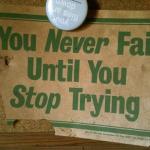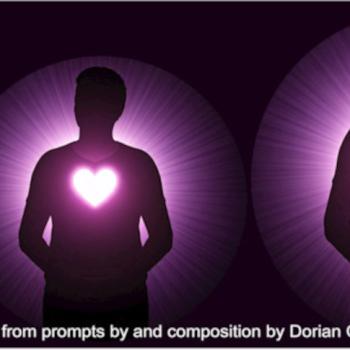My first real job, besides putting up hay and driving a tractor, was radio announcer. Went to university for it. I had the first rock and roll show on a regional station, and did the morning show. Impressive? I left. Great experience and confidence builder, but it didn’t change my life – won’t go into the reasons. But radio and music are still a part of me. I regularly post music on social media and recently wrote song lyrics for collaboration. I get a lot of enjoyment and satisfaction doing creative things.

Image composition by Dorian Cole from personal files of Dorian Cole
Jesus’ apostles were an eclectic group with a common cause. They dropped one purpose for something that had greater meaning to them.
The Apostle Paul was a tent maker and educated. The Apostle John was an uneducated fisherman. Jesus was a carpenter. Luke was a physician. The disciple Mark was a scribe (could write). They each had their place and perspective.
The Apostle Paul said about different jobs:
“I planted, Apollos watered, but God was causing the growth. So then neither the one who plants nor the one who waters is anything, but God who causes the growth.”
“And He gave some as apostles, and some as prophets, and some as evangelists, and some as pastors and teachers, for the equipping of the saints for the work of service, to the building up of the body of Christ;” – Ephesians 4: 11- 12 (NASB)
It takes all kinds.
Note: This series isn’t about diagnosis and treatment of personality disorders – see a clinician for that. This is about understanding what impacts our lives and those of others. It can help people recognize deficits in their lives that are barriers for them, and if needed seek out professional help to improve their lives.
People who feel they have had traumatic experiences that affect their lives should see a clinical psychologist or psychiatrist for help. I work with the nature of God, attitude change, life coaching, and positive psychology with its realism.
Why is it not enough for people to think that God loves them?
We all can find a place in this world where we feel loved, appreciated (valued), and that we make a contribution. But many of us don’t find places that are satisfying in all areas. God loves us but what do others think of us – that’s also very important. We can change life satisfaction through understanding and communication. We don’t need to have those deficits in our lives.
Going everywhere but nowhere
Most people don’t know where they’re going until they get there. – Popular, unattributed saying.
Or as Lewis Carrol put it: If you don’t know where you are going, any road will get you there.
I’ve had several full careers. Today I’m not unusual – having five careers is the norm. During these careers I’ve tried to stay true to myself.
One thing we have to come to grips with is that we are not the same as we were as children, nor as teenagers, nor new adults, nor as family people, nor in retirement. Our interests and what has meaning for us changes.
In our convoluted path through life we discover a lot of new things. We have to understand our needs and steer our lives if we want life satisfaction. Stay close to God’s way.
The quest to understand “the meaning of life,” is based on misconception. Meaning and purpose are different for everyone. We need to differentiate between ideas that compel others and what is compelling to us. We’re not compelled to act on every idea but on those things that are truly meaningful to us. From meaning comes purpose.
As one wise person said, “it’s about our approach to life.”
The best career path isn’t always a straight line. Ted Talk.
What is the Meaning of Life According to Positive Psychology – Everything you might want to know about meaning from Positive Psychology.
Don’t get lost in definitions and theories of meaning. Stick with what’s compelling to you. If it doesn’t move you then it has no meaning in your life. Find out what does move you. If you lack anything compelling, get experience in a lot of things. If everything moves you, then focus on your top one or three most compelling or you will get nowhere.
Your environment is kind of who you are
Psychologists generally feel that we’re partly influenced by nature (genes, etc.), and partly by nurture (our environment and the people in it).
I view meaning and purpose as a paradigm of many things that help form our identity. These include our national heritage, religious beliefs, parent’s values, peer and friend values, education values, workplace or professional values, political values, ethical and moral values, cultural values, club values, and many other influences. This paradigm, which forms the person’s identity, is usually fiercely defended from attack or change.
We react to these values as being for them, against them, or impassively. We don’t live in this world in isolation – we react to what is out there trying to influence who we are and accept or reject those values.
Years of study
I don’t walk into this series unprepared. I studied attitude change in college while other psychology majors were running rats through a maze. It prepared me to work with people who don’t have difficulty with their mental health (abnormal psych) although I recognize those who do.
Studying attitude change gave me a wonderful understanding of human nature and the human condition, and prepared me to delve into the deeper points of human motivation and of personal development. As a pastor, manager, and in other work this can be essential in my opinion.
I also have been part of many community and online psychology organizations and worked with attitude change in a number of careers. (For the record attitude change isn’t about manipulating others.)
Core Values
“To love and be loved is the greatest joy on earth.”
Studying core values helped me understand that every person is different. We simply don’t all value the same things. We may think that what’s important to us should be important in other’s lives, but it isn’t.
Some values, like to love and be loved are part of everyone. Yet all married people seem to realize that we get on with life and don’t spend all of our time being lovey-dovey. (God help those who neglect giving attention to their spouse.)
Our core values are who we are at a very basic level. These are at the core of our being and are what we are about as individuals. Threaten those and you threaten the very being of the individual. Great progress has been made on this since I studied it in depth in the 1990s. See the excellent resources below.
Core Values: List, Examples, and Exercises – Berkley Well-being Institute
Who Are you: Unleashing Your Core Values – Ted Talk
Core Values List: Over 200 Personal Values to Discover What’s Most Important to You
Personal Core Values List: 569 Scientific and Inspirational Examples
Ego isn’t a value
In personality theories, many psychologists posited the idea of ego. Freud talked about “ego,” as did several other psychologists. Ego isn’t a value. I came to realize that ego is our usually undamaged perception of ourself, and it can become a bunch of hot air that gets us by as children until we develop self-esteem. Some adults are still finding ways to pump up this ego balloon each time it gets deflated by some negative experience.
Ego is fragile and easily damaged. Ego comes from being loved, and if there is a deficit there it’s because the individual’s psyche has been injured. (Psyche: the human soul, mind, or spirit.)
Self-esteem, kind of a value, and important
Ego is replaced by self-esteem. We build self-esteem through doing and accomplishing. Books on self-esteem aren’t important enough to keep in my main library, but it’s important to differentiate between self-esteem that is built on concrete things, and false ego that is built on hot air and very fragile.
We need to enable our children to accomplish things to build self-esteem and confidence. In the Navy we held one of our medals in contempt and refused to wear it because it was given to everyone and had nothing to do with accomplishment.
I think it’s okay to give children an award for participating in challenges and not create a class of losers by only giving one person an award. But each individual child needs recognized in a similar way to how Olympians regard their accomplishments: they surpassed what they individually did before. People need to know they’ve accomplished something. But they shouldn’t be judged in context of the accomplishments of a world full of people. Few of us ever reach the top.
Early in my life I built self-esteem in farm work and in radio, and our daughter built self-esteem by flying planes. We accomplished individual challenges. I wasn’t the best. I’m never the best at anything – but others aren’t the ones doing it, I am.
Why radio for me and flying planes for our daughter? Everyone’s different.
For years I belonged to an organization of professionals that explored “meaning.” What has meaning to us? I explored meaning, purpose, and meaning-making. I could only conclude that everyone is different. There are few blanket statements that can be made.
We can identify some of the things that are meaningful to others, but not apply them to everyone, and not identify everything that can be meaningful. The links in this article below identify hundreds of things that people find meaningful and compelling.
From self-esteem can come the confidence to take on bigger challenges. Each challenge helps prepare us for the next.
My experience
My example is a good illustration. I worked in the electronics field for a number of years. I often got to design electronic and architectural things for companies and still do sometimes. One was a circuit that prevented a research institution from losing rare biological disease samples collected from children during power outages.
Electronics was kind of like a hobby and didn’t have a lot of meaning for me. I left that to get more education to become a pastor, which I loved. I found I was good at analyzing, seeing things in context, teaching, and communicating these to others in written communications, poems, and movies, which is what I’ve done for decades. Communication and creativity are essential parts of my life and careers and needed in every one of them.
I learned that a core value for me is creativity. Another is working constructively with people. Another media communications. I put these to good use in multiple careers.
I love variety in my endeavors. I love it that God created such a diverse world with enormous variety in nature and in people. I love doing different things every day. In one career I went to different research universities and hospitals every day.
I love seeing people succeed and potentially helping them succeed. Nurture and develop. I love entertaining people. We all need laughter and fun.
I have also always been about equality and equal opportunity – a fair and just life for everyone. And much more. I find compelling things every day.
I have other core values as well, the above are just examples. When those core values aren’t satisfied, I’m not happy. Not that life is always balanced and we have happiness from everything every day. Definitely not – very rare.
Other’s experience
I’ve seen many people wear masks that say they’re happy at work, only to go home and do something more meaningful, or hit the bottle of alcohol, or have a midlife crisis that destroys their family and livelihood. I’ve seen physicians and ministers leave for other careers such as politics. Just because we’re good at something, that doesn’t mean it has meaning for us, or has meaning all of our lives.
Being good at something or having an aptitude for something doesn’t mean that’s our singular purpose in life. People are complex, grow, and change. They become capable of so much more.
“… From everyone who has been given much, much will be required; and to whom they entrusted much, of him they will ask all the more.” Luke 12:48 (NASB)
Wide experience helps careers
Before the 1970s people learned careers from their parents, or they attached themselves to jobs that were often considered lifetime employment and security. I worked in the 1980s for one of the largest companies in the world that had never had a layoff. But they finally had to do it and created early retirement programs.
Lifetime employment security rapidly changed in those decades, bringing us to the conclusion that there is no loyalty from companies or employees. Moving jobs overseas to low pay countries, and merger mania, take sizable chunks of communities and destroy those that aren’t diversified. There is no job security.
Many enter college and finally declare a major in their junior year, not because they’ve found the right career for them, but because they have to. Then some are stuck with something they don’t want and feel they can’t escape. It leads to midlife crisis, or people with degrees in finance doing floral arrangements for a living.
Many in Generation Z and Millennials look with fear and disdain at what happens in business and determine that they want to be entrepreneurs and start their own businesses. Turning your home, family, and future over to a business just isn’t worth it.
We have very wrong ideas about careers and life satisfaction.
More and more businesses are looking for people with diversified career experience. They’re highly valued because they can draw on diverse experiences and also find new points of view.
How Diverse Job Experience is an Asset. – Search
4 reasons to seek out employers with diverse workforces. – Job site Monster
Takeaway
It isn’t for any of us to decide what has or should have meaning and purpose to another individual. We’re all different. We all work as children of God in different pursuits that make up a loving world.
“Whatever you do, do your work heartily, as for the Lord rather than for men ….” – Colossians 3:23 (NASB)
Series Links
Meaning and Purpose series – What is meaning?
Feeling undeserving except of punishment
Becoming – Reinventing Yourself
Additional Resources
Why specializing early doesn’t always mean career success. – Ted Talk
Why some of us don’t have one true calling. – Ted Talk
How to find work you love. – Ted Talk
The best career path isn’t always a straight line. – Ted Talk.
Core Values: List, Examples, and Exercises – Berkley Well-being Institute
Who Are you: Unleashing Your Core Values – Ted Talk
Core Values List: Over 200 Personal Values to Discover What’s Most Important to You
Personal Core Values List: 569 Scientific and Inspirational Examples
Series links
Meaning and Purpose series – What is meaning?
Feeling undeserving except of punishment
Becoming – Reinventing Yourself
______________________
Our answer is God. God’s answer is us.
– Dorian














